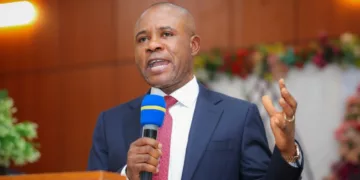It is with a heavy heart that we must again address the recurring tragedy on Nigeria’s inland waterways. In the past five years, over 1,500 innocent lives have been cut short by avoidable boat mishaps across the nation. This tragic trend shows no signs of abating, as evidenced by the nearly 300 lives already lost in 2024 alone.
From Lagos to Kano, and from Adamawa to Cross River, the grim statistics are a haunting reminder of the unchecked menace threatening the safety and livelihoods of Nigerians dependent on the waterways. On Monday, October 7, 2024, yet another preventable tragedy unfolded in Lagos State as two overcrowded boats collided in the lagoon near Imore town, Amuwo-Odofin local government area, resulting in three confirmed deaths and two missing persons. This latest incident is not an isolated accident but a painful reflection of systemic failures and a gross abdication of responsibility by regulatory authorities and boat operators.
These incessant boat mishaps are not merely accidents – they are the direct result of negligence, recklessness, and incompetence. Rickety, poorly maintained boats, blatant overloading, and a shocking disregard for safety regulations are all too common on our waterways. Worse still, underwater wrecks litter the routes, creating navigational hazards that further endanger passengers. Despite this appalling state of affairs, the National Inland Waterways Authority (NIWA), the federal agency charged with enforcing safety standards on our inland waters, has consistently demonstrated a disturbing lack of capacity and will to fulfil its mandate. NIWA’s inadequacies are further compounded by similar failures at the state level, where local regulatory and safety agencies have all but abandoned their responsibilities to ensure safe passage for Nigerians.
The culpability of NIWA in the ongoing boat mishaps is undeniable. Year after year, we hear ambitious plans and lofty promises from NIWA officials, but their rhetoric has yielded no tangible results. The authority’s failure to act decisively on safety issues can no longer be overlooked. What has NIWA done to ensure that boats operating on our waterways are seaworthy? Where is the enforcement of safety protocols to prevent overloading and compel the use of life jackets? Why are operators allowed to continue using boats that are little more than floating death traps? The agency’s tepid response to these pressing issues is inexcusable. We need action, not empty words, from NIWA. It is clear that unless there is a comprehensive overhaul in both policy and leadership, the agency will remain ineffective in safeguarding the lives of Nigerians.
The responsibility for these tragic incidents also lies with state safety and regulatory agencies, which, like NIWA, have failed to enforce safety regulations adequately. These agencies were created to oversee and protect local waterways, yet they, too, have consistently fallen short of their obligations. It is unconscionable that in coastal states, where boats serve as a vital means of transportation and livelihood for many, the authorities have allowed safety standards to lapse so egregiously. Instead of being proactive, these agencies respond to each new tragedy with the same tired excuses and ineffectual platitudes. Such a dereliction of duty is beyond unacceptable – it is a betrayal of public trust.
Meanwhile, boat operators have proven to be equally negligent, placing profits over the safety of their passengers. Many operators knowingly overload boats far beyond safe limits, ignoring basic safety regulations in pursuit of extra fares. These operators gamble with lives every day, exploiting the lack of oversight to cut corners. The tragic cost of their recklessness is now painfully evident. It is high time these operators are held accountable for endangering the lives of those who depend on them for transportation.
The federal and state governments can no longer afford to be reactive, issuing hollow condolences after the fact. It’s time for proactive, lifesaving solutions to ensure safety on our waterways. We must implement immediate reforms and strong penalties to end this endless cycle of death. First, NIWA must be overhauled and empowered to enforce safety standards rigorously. This includes conducting regular inspections of all boats to ensure their seaworthiness and strictly penalising operators who overload vessels or ignore safety regulations. All boats should be required to carry enough life jackets for every passenger, and these must be worn at all times.
State governments must also step up to fulfil their regulatory responsibilities, collaborating with NIWA to provide comprehensive oversight across Nigeria’s inland waterways. Underwater wrecks and other obstacles that endanger navigation should be removed.
Boat operators, too, must recognise their role in this crisis. Profits cannot be prioritised at the expense of human lives. We call for mandatory training programmes for all boat operators, focusing on safety regulations, emergency response procedures, and basic maintenance standards. Many of these operators lack formal training, which only exacerbates the dangers passengers face. By establishing certified training programmes, we can ensure that every operator has the knowledge and skills necessary to provide safe transport. At the same time, boat operators who repeatedly flout safety regulations should be banned from operating, and their vessels should be confiscated or decommissioned to prevent further endangerment.
Furthermore, the government should invest in a national awareness campaign about water safety, targeting both passengers and operators. Information on the importance of using life jackets, obeying capacity limits, and taking other precautionary measures should be widely disseminated. Public awareness campaigns, conducted in local languages and through various media channels, will ensure that even rural communities are informed about water safety. In this way, passengers themselves can be empowered to refuse unsafe practices, thereby contributing to a culture of safety on our waterways.
Nigeria’s inland waterways also need enhanced technology and infrastructure. More navigation aids, such as buoys and beacons, should be installed to mark dangerous areas and provide clear routes for boats. Increased investment in dredging and clearing operations can greatly improve waterway safety, reducing the likelihood of accidents.
Additionally, maritime safety officials should have an increased presence on busy waterways, ready to respond quickly to emergencies and enforce regulations on the spot.
Finally, we must address the issue of accountability. After each boat tragedy, there is a flurry of media coverage, statements from officials, and promises of reform. But as soon as the spotlight fades, so does the urgency to act. To ensure lasting change, the federal government should establish an independent oversight body to investigate all serious boat accidents, publish its findings, and recommend corrective actions. This body should have the power to hold NIWA and operators accountable for lapses in safety, and to impose fines or other penalties on those who fail to comply with safety standards. Such a body would serve as a watchdog, ensuring that safety remains a priority and that those who endanger lives are held responsible.
The lives lost in these waterway disasters are not just statistics; they are human beings with families, hopes, and futures. Nigerian lives should not be sacrificed to systemic incompetence, indifference, or greed. The time has come for all stakeholders – NIWA, state agencies, and boat operators alike – to take responsibility and end the epidemic of fatal boat mishaps. The Nigerian public must demand no less than a comprehensive overhaul of waterway safety regulation, enforcement, and education. Let this be a call to action, for if we continue to do nothing, we are all complicit in the next tragedy.
–Dr Akinola, a maritime expert writes from Lagos











